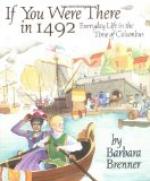Oppression of the Indians.
And if so, what did she see there? How different was the aspect of things from what governors and officers of all kinds had told her: how different from aught that she had thought of, or commanded! She had insisted that the Indians were to be free: she would have seen their condition to be that of slaves. She had declared that they were to have spiritual instruction: she would have seen them less instructed than the dogs. She had ordered that they should receive payment for their labour: she would have found that all they received was a mockery of wages, just enough to purchase once, perhaps, in the course of the year, some childish trifles from Castile. She had always directed that they should have kind treatment and proper maintenance: she would have seen them literally watching under the tables of their masters, to catch the crumbs which fell there. She would have beheld the Indian labouring at the mine under cruel buffetings, his family, neglected, perishing, or enslaved. She would have marked him on his return, after eight months of dire toil, enter a place which knew him not, or a household that could only sorrow over the gaunt creature who had returned to them, and mingle their sorrows with his; or, still more sad, she would have seen Indians who had been brought from far distant homes, linger at the mines, too hopeless, or too careless, to return.
Petitions of Columbus; injustice of the king.
Turning from what might have been seen by Queen Isabella, had her departing gaze pierced to the outskirts of her dominions, we have to record the closing scene of the strange eventful history of Columbus, who did not long survive his benefactress. Ever since his return from his fourth voyage to the Indies, he had done little else than memorialize, and petition, and negotiate about his rights. But Ferdinand, who had always looked coldly on his projects, was disposed to regard his claims with still less favour. Columbus professed himself willing to sacrifice the arrears of revenue due to him, but urged strenuously his demand that his son Diego should be made viceroy of the Indies, in accordance with the terms of the grant making that dignity hereditary in his family. Ferdinand did not refuse absolutely: the breach of faith would have been too flagrant. But he procrastinated, and ended by referring the matter to the significantly named Board of Discharges of the Royal Conscience, which board regulated its proceedings by the known wishes of the king, and procrastinated too.




